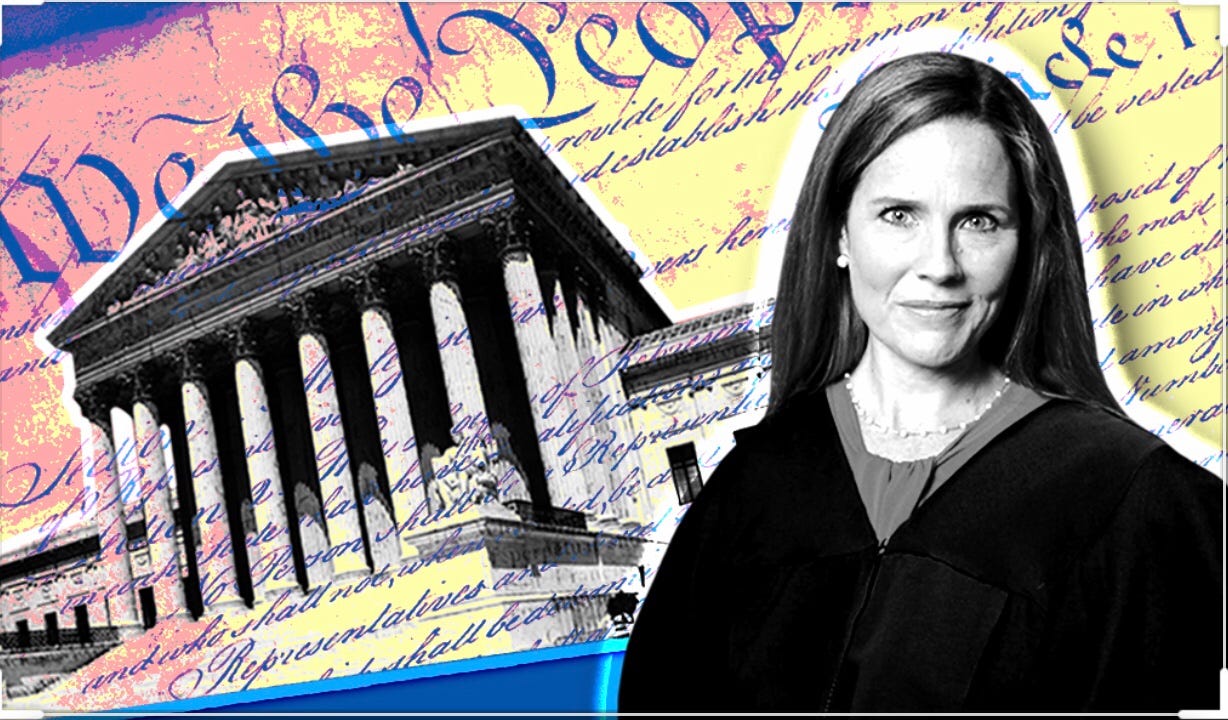
In her judicial opinions as well as her personal views, federal Judge Amy Coney Barrett’s past speaks for itself. Before the Senate Judiciary Committee charged with rushing to rubber stamp her nomination to the Supreme Court, for all that she avoids in giving her opinion on abortion rights or anything else, doing so sometimes with finesse, sometimes evasively, it is still undeniable that her worldview is ultraconservative. She belongs to a traditional, charismatic, and semi-secretive Catholic group (People of Praise). She used to be a member of the Federalist Society, a conservative and libertarian organization that encourages a textual – read: fundamentalist – interpretation the U.S. Constitution and has worked since the 1980s to recruit potential judges who are firmly planted on the right. As a jurist, her opinions have shown strong support for the right to bear of arms and extending the role of religion into public life, contrary to what the majority of Americans believe, including Catholics, who are generally not that observant. In the past, she has not hidden her conviction against abortion nor her disagreements with the Affordable Care Act, which the Supreme Court will weigh in on in November.
In short, the hearings are over, meaning that they will now adhere to a norm established a long time ago: namely, that they usually come down to a “vapid and hollow charade,” as law professor Elena Kagan unambiguously put it in 1995, 15 years before President Barack Obama named her to the Supreme Court.
Last year, as a federal appellate judge, Barrett wrote in a dissenting opinion that the government should be able to take away the right to vote, but not the right to bear arms, with respect to a man who pleaded guilty to Medicare fraud. In another opinion, she found that judges should not stop the deportation of immigrants who risk facing torture in their home countries.
The “charade,” as Kagan put it, is so evident that when you hear Republican Sen. Lindsey Graham ask Barrett whether she could “set aside whatever Catholic beliefs you have regarding any issue before you?” and then hear Barrett respond, “I can. I have done that in my time on the Seventh Circuit,” one can only conclude that the Republicans are taking advantage of the political illiteracy of a certain number of Americans—and doing so in the context of having the hearings be less a legislative confirmation process and more an electoral spectacle produced less than three weeks before the Nov. 3 presidential election.
As she claims to be independent, there is no more reason to be reassured upon hearing the judge say that she will not be a “pawn” of the current president. She is, nonetheless, an ideologue, an apostle of the late, ultraconservative Justice Antonin Scalia, and a woman who is a long way from the more conciliatory kind of positions that would be useful for judges to take in order to restore civil dialogue in the United States. Donald Trump’s choice, this president who is losing it, is certainly bad for American democracy, bad for the balance of powers, and bad for Congress’ legislative authority. Thus, by strengthening the right’s majority on the Supreme Court, Trump is giving himself over to a political and ideological manipulation of the judicial system, the likes of which has never been seen before. At 48, Barrett will be around long after Trump. Her nomination is full of dangerous implications.
But this nomination, which thrills Trump’s evangelical base, is bad for his reelection prospects to the extent that it will certainly galvanize the Democratic base; first, because of the nature of the nomination, and second, because of the anti-democratic way that it is being imposed upon voters so shortly before the presidential election. The fact that Trump, a “miracle” survivor of COVID-19, is holding rallies in swing states indicates that he is in trouble. That early voting and voting by mail are significantly up from 2016 is another.
American elections are complicated affairs, where Republican efforts to restrict access to voting play a key role. The small Republican majority in the Senate will likely confirm Barrett’s nomination next week. Afterward, Trump will obviously want to use it to his advantage in his debate with Joe Biden on Thursday, Oct. 22. Some good it will do him. He is not growing his base with Barrett. Biden is.

Leave a Reply
You must be logged in to post a comment.